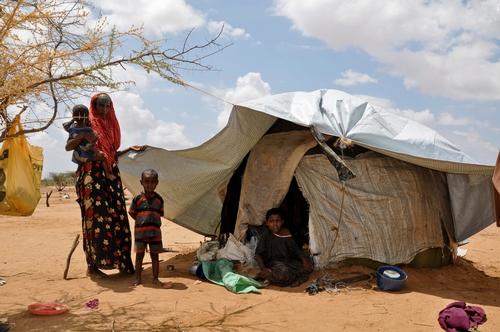Daghaley is one of three camps in Dadaab, Kenya, that were set up in the early 1990s to house Somali refugees. Camps that had originally been built to accommodate 90,000 people are today struggling to cope with close to 300,000 people. MSF started to work in Dagahaley camp,, in March 2009 where through a 100-bed hospital it provides medical care including surgery and maternal health services, with more than 600 patients admitted per month. The four MSF health centres offer vaccinations, antenatal care and mental healthcare with an average of 10,000 patient consultations every month.
Geneva/Nairobi —“Hundreds of families have been living in makeshift shelter in a no man’s land over the past four months, waiting to be re-located in a proper camp” says Joke Van Peteghem, MSF’s head of mission in Kenya. “These refugees are in dire need of assistance given the hardships they have endured. With the onset of the rainy season, we must act now”.
The heavy rains of the past 48 hours in Dagahaley have flooded the area where these families are settled, worsening the already harsh living conditions for those who could not find shelter inside the refugee camp. Each month, thousands of refugees, many of them women and children fleeing the war in Somalia, cross the Kenyan border after an often treacherous journey on foot. Today, they face alarming shortages of food, water, sanitation and adequate shelter while the refugee camp is severely overcrowded and cannot accept them. Although a site has been identified for the new refugees, relocation to the site has been delayed.
In response, Médecins Sans Frontières carried out rapid medical screenings of the refugees referring the people in need of medical care to the health facilities. MSF also provided shelter material to 700 families and together with other actors ensured the supply of water.
Yet, as the existing camp cannot accommodate the steady flow of Somali refugees who flee their war-torn country, the international medical organisation raises the alarm. “We are at a dead-end. While we have distributed plastic sheeting to the new refugee families, it is far from enough, especially now that the rainy season has started. We call on the Kenyan authorities and aid actors to immediately facilitate their relocation to suitable accommodation,” concludes Joke Van Peteghem.




